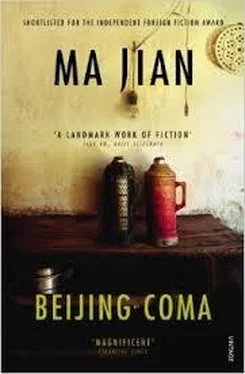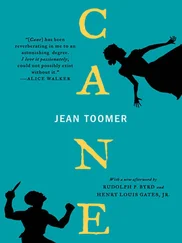We walked into the dissection lab. The room was stuffy and smelt of formalin.
Professor Huang was a celebrated cardiovascular specialist. The successful heart transplants he performed were often reported by the press. His lectures were fascinating. Even the most squeamish of students would stay to the end.
This was the first time we’d been shown a fresh corpse. All the bodies we’d seen before had been preserved in formalin solution. Everyone was eager to take a close look.
The corpse lying on the wooden table before us was that of a young male convict. There were freckles on his nose. The bullet that had killed him had blasted one of his eyes out. All that remained of it was an empty socket splattered with black, congealed blood and gunpowder.
Professor Huang slipped on a pair of surgical gloves and said, ‘This dissection will focus on the brain and spinal cord. We have to leave the rest of the body for the other departments to study. You must pay close attention. It wasn’t easy getting hold of this corpse.’
My eyesight was good — approximately R:1.5 L:1.5. I could see the dandruff flaking from the professor’s scalp.
‘Look, here. Because they needed his heart and lungs for the transplant, they shot him in the back of the neck, not the chest. The bullet entered the medulla oblongata, giving the surgeons a window of fifteen seconds to remove the heart and lungs before the donor lost consciousness and died.’ He twisted the corpse’s neck around a little and pointed to the bullet wound.
‘Agh!’ the students cried.
‘That wouldn’t have given them enough time to even disinfect the skin,’ said a student standing next to A-Mei.
‘I don’t believe they could do it that fast!’ Mou Sen said, sweeping back his long fringe. ‘It would take them at least ten minutes just to locate the aorta and pulmonary artery.’
‘I haven’t finished, students… Medical technology has developed very rapidly. As soon as the bullet hits the hindbrain, the trachea is tabulated, and intravenous drugs are administered to allow the donor to resume a normal heartbeat. The chest is opened. The organs are then swiftly removed and taken to the operating theatre, where the recipient’s diseased organs have been removed and extracorporeal circulation has been established…’
‘I didn’t know that execution grounds are equipped with operating rooms,’ Wu Bin said, his triangular eyes lighting up. When he talked about Nazi gas chambers, he would give us every detail, down to the dimensions of the doors and windows. It was as though he’d been in one himself.
‘Last year’s Ministry of Health guidelines allowed surgical operations to be carried out in ambulances parked outside the execution grounds. But the success rate of the operations was low. The demand for organs has risen recently, especially from foreign patients who can pay in foreign currency, which is good for our economy. So to improve efficiency and meet demand, the government has now permitted executions to be carried out in the hospital where the organ transplant will be performed. This has taken place at South China Hospital, near Number One Military Medical College, as well as at the Military Science University Hospital.’
‘I’ve heard people say that it’s inhuman to remove organs from a living person,’ said Tang Guoxian from the back of the room.
Wang Fei moved to the front. ‘In the Nuremberg trial, Nazi doctors claimed that the Jews had participated in their medical experiments of their own free will,’ he said. ‘But the judges argued that prisoners who live in fear for their lives are incapable of granting free and voluntary consent.’ When Wang Fei held forth, he always liked to speak at the top of his voice. He didn’t care whether anyone could understand his Sichuan accent.
‘Before the counter-revolutionary Li Lian was executed in 1971 for criticising the Cultural Revolution, four policemen pushed her face against the window of a truck, lifted her shirt and cut out her kidneys with a surgical knife,’ Mou Sen said, his face stony and white. ‘I think that removing the organs of convicts while they are still alive is too much. It completely contravenes medical ethics.’
‘This is a dissection class, not a political meeting,’ Sun Chunlin said self-righteously. In our dorm, whenever our discussions reached a critical juncture, he would always butt in with a negative comment that would kill the conversation dead.
Professor Huang didn’t seem annoyed by these interruptions, but he was wearing a face mask, so it was hard to tell. He cleared his throat and said, ‘Wouldn’t it be a waste to cremate a corpse without making use of its organs first? We don’t have much time left, so if any of you want to leave, leave now. And if you want to say something, put up your hand first.’
At this, Wang Fei turned and left. Mou Sen, who was leaning against the electric microscope, hesitated for a moment but decided to stay.
Professor Huang drew a line around the corpse’s head, then pointed to me and told me to start sawing it open. The steel hacksaw wasn’t large, but when I picked it up it felt very heavy. I pulled back the corpse’s ear. It was the first time I’d touched a dead person. I sawed through the skin below the earlobe. The hair had been shaven, probably just before the execution. The scalp felt slippery when I pressed it. My hands trembled. I was so anxious, I didn’t know in which direction to cut. I dragged the hacksaw back and forth a few more times, then gave up.
I turned to Wu Bin and asked him to take over. There was only one spare pair of rubber gloves, so I removed them from my hands and handed them to him.
Until now, we’d only performed dissections on preserved body parts. I glanced at A-Mei through the corner of my eye to check how she was coping.
The male students went over to the corpse and took turns to saw around the head until at last the top of the skull was lifted off, revealing the pink, blood-flecked brain inside. It looked much spongier than the brains soaked in formalin that we’d been shown before. A fine mesh of red capillaries covered the outer membrane, and an intricate network of blue veins ran through the folds in the cerebral cortex below. Professor Huang asked the students to point out the frontal, parietal, occipital and temporal lobes, and explain their respective functions. Then he picked up his knife and made a vertical incision down the length of the brain.
‘It’s like cutting a birthday cake,’ Professor Huang joked, but no one smiled. I glanced at A-Mei again. I’d bought her a cake on her birthday, but the cream had gone off so she’d had to throw it away. She was staring down at her notebook. She never looked up during the dissection classes. One time, she was handed a piece of human calf muscle to practise her dissection skills on, and was so horrified that she vomited on the floor. She didn’t seem cut out to be a doctor.
In the past, I’d imagined Hong Kong as a debauched and corrupt city of capitalists and prostitutes, but after I met A-Mei, I realised that it upheld many traditional Chinese family values that we in the mainland had lost. A-Mei was very close to her family, whereas I didn’t know the dates of my parents’ birthdays, or even my grandfathers’ first names.
One day, A-Mei had asked me why I’d only told her that I loved her after our first kiss. I said that once was enough, and that there was no need to repeat myself now that she was mine. My reply upset her so much that she burst into tears.
In fact, she’d forgotten that I’d repeated to her that I loved her just a few days before, while we were lying on top of a hill. It was a Sunday. The weather was beautiful, so we decided to take a bus to a nature reserve an hour’s drive away. I reached the top of the hill before her, and lay down on the grass, panting for breath. When she made it to the top, she crawled over and lay down beside me. The plimsolls she’d bought especially for the trip were wet through. I took them off for her and watched her warm little toes wriggle and curl. I moved on top of her. She lifted her hips, then lowered them, and we soon dissolved into each other. When I closed my eyes, I felt I was floating through the blue sky with her. I cried out, ‘I’m in Heaven!’ then whispered in her ear, ‘I love you, A-Mei…’
Читать дальше












